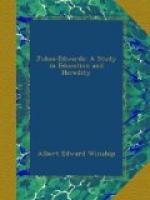CHAPTER IV
THE CHILDREN’S START IN LIFE
The eleven children of Jonathan Edwards had an unenviable start in life so far as their environment was concerned. The oldest was still in her teens when serious trouble arose in the parish at Northampton. Mr. Edwards was pastor at Northampton for twenty-five years, and a more fruitful pastorate or a more glorious ministerial career for a quarter of a century no man could ask. He made that church on the frontier the largest Protestant church in the world, and it was the most influential as well as the best known. There began the greatest religious awakening of modern times. In his church, resulting from his preaching, began a revival which stirred into activity every church in Massachusetts, every church in the colonies, and most of the Protestant churches of Great Britain and Europe.
After this long and eminently successful pastorate, Mr. Edwards preached a sermon about the reading and conversation of young people upon subjects of questionable propriety, which led to such local excitement that upon the recommendation of an ecclesiastical council he was dismissed by a vote of 200 to 20, and the town voted that he be not permitted on any occasion to preach or lecture in the church. Mr. Edwards was wholly unprepared financially for this unusual ecclesiastical and civic action. He had no other means of earning a living, so that, until donations began to come in from far and near, Mrs. Edwards, at the age of forty, the mother of eleven children with the youngest less than a year old, was obliged to take in work for the support of the family. After a little time Mr. Edwards secured a small mission charge in an Indian village where there were twelve white and 150 Indian families. Here he remained eight years in quiet until, a few weeks before his death, he was called to the presidency and pastorate of Princeton, then a young and small college.
The last four years of their life at Northampton were indescribably trying to the children. Human nature was the same then as now, and everyone knows how heavily the public dislike of a prominent man bears upon his children. The conventionalities which keep adults within bound in speech and action are unknown to children, and what the parents say behind a clergyman’s back, children say to his children’s face. This period of childhood social horror ended only by removal to a missionary parsonage among the Stockbridge Indians, where they lived for eight years. Their playmates were Indian children and youth. Half the children of the family talked the Indian language as well and almost as much as they did the English language.




